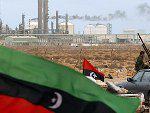
(photo: NewsWarped.com)
Husni Bey, a Libyan entrepreneur, employed the language of legend to express confidence in his country’s ability to rebuild itself after decades under Gaddhafi. “Definitely, Libya is an El Dorado,” he said. “It has great resources that [will] really allow it to turn around in no time.” Indeed, with vast fields of oil beneath it, Libya’s natural wealth is substantial. While many countries would buckle under the weight of a post-civil war reconstruction that some estimate will cost $80 billion, Libya should have no problem paying its bills.
Yet, while this oil revenue should ease the costs of Libya’s reconstruction, many observers are concerned that it could make Libya’s path to democracy hazardously slick. That’s because all too often an abundance of natural resources, oil in particular, allows wealth and power to gather into the hands of the few and prevents the development of democracy. El Dorados usually make poor democracies.
Indeed, since the 1960s and 1970s when many states began to seize control of their oil resources from Western oil companies, many scholars have noted an inverse relationship between oil export revenues and freedoms in a given country. Headed by countries such as Saudi Arabia and Iran, a perusal of the world’s largest oil exporters reads like a roll call of autocracies. This relationship is more than a correlation.
In these countries, oil distorts the relationship between state and citizen. States that do not require tax revenue to provide services to their citizens are less likely to feel accountable to them. When citizens express frustration, the state can co-opt them with handouts. If that fails, these states are able to lean on their disproportionately well funded coercive apparatuses. Unaccountable to their citizens and flush with revenue, resource-rich states can become incubators for corruption. Such was the case under Gaddhafi whose nationalization of Libya’s oil allowed the country’s descent into kleptocracy.
Fortunately, the connection between oil and corruption is not a fait accompli in Libya. In the wake of Gaddhafi’s fall, some have shifted their attention to Norway, which has largely broken the link between oil and corruption, as a possible model for Libya. By limiting the amount of oil companies may drill and shielding oil revenues from the reach of government officials, Norway has managed to facilitate the growth of a diverse economy and transparent political system.
In Libya, a country in which tribal identity is an important means of social organization, the distribution of oil revenue has the potential to combust. The distribution of oil revenue has already emerged as a source of contention: Businessmen based in Benghazi, an eastern city that suffered disproportionately under Gaddhafi and ultimately spawned the now ruling National Transitional Council (NTC), have launched a campaign to pry the state-owned National Oil Company away from Tripoli.
The Norwegian model cannot and should not be applied directly to Libya, a country whose similarities to Norway may start and end with its oil wealth. Still, it is heartening to know that by fostering transparency and accountability, a country can avoid succumbing to the oil curse. With critical decisions regarding the distribution of oil revenue among Libya’s many tribes looming, the time to focus on instilling and institutionalizing these values is now.
Libya will likely resume oil exports in the next week or so. The International Energy Agency projected that Libyan oil production, currently operating at about ten percent capacity, will reach 1.1 million barrels a day by the end of next year. While this amount would still be below capacity, it would nevertheless represent a massive flow of revenues into the economy.
Should consequential decisions about oil revenues be made by the consensus of representatives of all Libyans in an atmosphere of transparency and accountability, they could infuse Libya’s fragile transition with the confidence of its people. Should it appear that the victors of Libya’s civil war are merely collecting their spoils at the expense of the losers, however, Libya’s transition to democracy will have been made more difficult. Libyans would be wise to focus on creating a transparent system that limits opportunities for abuse before the oil resumes its free flow. Many El Dorados have become miserable places in which to live. With transparency and good governance, Libya – like Norway – can become an exception.

